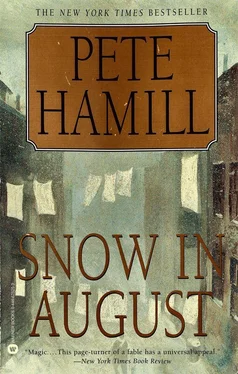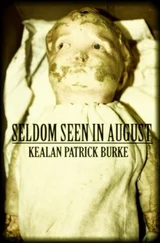“In the world, all over, there are people with no cousins and no uncles,” the rabbi said. “But your mother you got. You are lucky.”
Michael didn’t speak about Mister G or Frankie McCarthy either, or some other things that happened on Ellison Avenue. One Saturday night the snow came down hard again, although not as hard as it did during the great blizzard after Christmas. By early afternoon the parish men were drinking and singing in Casement’s, which Michael’s mother told him was named for an Irish patriot named Roger Casement (just as Collins Street was named for Michael Collins, another Irish martyr). Before he went to bed that night, Michael glanced down at the yellow light of the saloon and saw a blur of men through the glazed windows. There were no women there. And he thought: My mother has no man and those men have no women. Somehow the arithmetic doesn’t add up. She’s pretty. She’s smart. She works hard. Why won’t one of them ask her to go to a movie down at the Grandview? Why can’t one of them take her to a goddamned dance?
In the morning, there was a great crowd on Collins Street and a police car with its doors open. Michael ran over. One of the uniformed cops told him to stand back, and a woman grabbed him by the arm and jerked him aside and said, “Don’t look at this.” But he looked anyway and saw the frozen body of an old man, wedged between two snow-covered cars. Michael could see rotten brown teeth in the man’s open mouth. The eyes were wide and scared and had no color. Snot was frozen in his nostrils. Someone said, “Name’s Shields, Officer. Jack, or Jimmy, I can’t remember. A wino from down the Hook.” The cop wrote this in a notebook. Michael stared at the dead man, whose arms were half-raised, his clothes too frail for the snow that covered them, and wondered if he’d had a wife or children.
Then in his mind he put his father’s face over the face of the dead man and he left Brooklyn. He saw his father sprawled in the snow in a frozen forest in Belgium. The trees around him had no tops. Ruined tanks were everywhere, covered with snow. Other soldiers were leaning down to look at his father’s face. Don’t look at this , a woman’s voice said in the snows of Belgium, but there were no women to be seen. Michael stared at his father’s eyes. They were seeing him, knowing him, full of need, as if he were trying to say words. And then he was gone and Michael was back in Brooklyn.
At Sacred Heart School, he could not explain to Brother Donard that image of the dead man in the snow and the way it was mixed up with the face of his father. He did not even try. Nor did he decide to mention it to Rabbi Hirsch, who had heard enough about death. Instead, he worked hard in class, doing homework during study periods, making notes while Brother Donard spoke. Most of the other kids didn’t bother with notes. They stared out the window. They drew airplanes. They made faces at each other, trying to provoke laughs. But Michael had discovered that making the notes helped him to remember things. If he wrote down a word, then a memory of it was stamped in his brain. When he needed it, the word appeared. He didn’t know why. The brothers didn’t teach them to do it that way. But it worked for Michael. And besides, when the time came to study for a test, he could look at the notes and all the words would come back to him. It was a form of magic. The words were gone, vanished, disappeared from the world, and then suddenly— Shazam! — they were there when he needed them.
Words themselves had a special power and mystery to Michael. In Latin or Yiddish, they were like those secret codes used by spies, or members of secret societies, which he sometimes wrote down while listening to Captain Midnight on the radio. But even in English, a word wasn’t as simple as it looked. The letters H-O-R-S-E were combined into horse . But what kind of a horse? Which horse? Gene Autry’s horse Champion? Roy Rogers’ horse Trigger? And that other cowboy, Ken Maynard, had a horse named Tarzan even though they didn’t have any goddamned Tarzan books in the Wild West. There were big police horses and the small horses people rode in Prospect Park in the summertime and the racehorses that the men in Casement’s Bar bet on with Brendan the bookmaker. There were colts and stallions and ponies and yearlings, pintos and broncos, steeds and mustangs, and those were just horses he’d learned about at the movies in the Venus. And down at the lumberyard at the bottom of Collins Street they used sawhorses, which were made of wood! Sometimes, words didn’t name things very clearly. They could get confusing.
Michael would think these things late at night, trying to sleep. The right words helped drive out the terrible occasions of sin, those images of women that kept swimming through his head: Judith with her golden skin and Hedy Lamarr and a French woman he saw in a Tarzan movie in the Venus. Denise Darcel. Their eyes and skin and hair and teeth would come from nowhere into his mind and he would feel strange and his penis would get hard and he would want to touch it. Then he would try to resist with words. Magic words. Europe. Steeples. The Vatican. Japan. Horses. Hallways. Pigeons. Jeeps. Each word was like the cross held aloft to confront Dracula. Each word was like the magic amulet employed by Tiny Tim in the Sunday comics of the Daily News .
Words had assumed another importance too. He was thinking about them in new ways because of Rabbi Hirsch. There were words he knew without having any memory of learning them; he just knew them, the way he knew baseball. But Rabbi Hirsch didn’t know these words in English, so he had to explain them, spell them, look them up in dictionaries. And when he had given those words to Rabbi Hirsch, the man made them his own. If Michael corrected his pronunciation, the rabbi never again made the old mistake. He repeated the word, wrote it into a school composition book, tried it out in sentences. The rhythms of those sentences were often wrong; the verbs were in the wrong place. But the rabbi treated words as if they were jewels. He caressed them, handled them with his tongue, repeated them with delight, turned them over for a view from another angle. Sitting with the rabbi on January afternoons, watching him plunge into words, Michael couldn’t believe he was ever afraid of the man, and he wished everyone in the parish could see how hard the man was working at becoming an American.
The rabbi also taught by example. Michael realized that he had never done with Latin what the rabbi was doing with English. He barely knew what the Latin words meant, and he certainly could not speak Latin. And neither could the priests at Sacred Heart. They all spoke English to each other. The priests and the altar boys recited Latin, like actors in some play. The priests often read the Latin prayers from books, while the altar boys called up the replies from brute memory. And Father Heaney raced through Latin prayers as if they were a bore. Michael did love the sounds of the Latin words, the flowing vowels, the abrupt consonants. But they were part of a code he didn’t fully understand.
Spurred by the example of Rabbi Hirsch, he went to Father Heaney and borrowed a translation of the liturgy of the mass, and within days the Latin code was partially cracked. But the new knowledge made him feel deflated. What was being said in the ceremony of the mass no longer seemed as mysterious. Ite, missa est , for example, meant Go, the mass is finished. Deo gratias meant Thank God. He laughed when he read that, because that’s how he sometimes felt, after a long, slow, drowsy mass. Thank God this is over, he would think, because now I can pick up the buns at the bakery and go home to breakfast. Deo gratias .
Читать дальше












